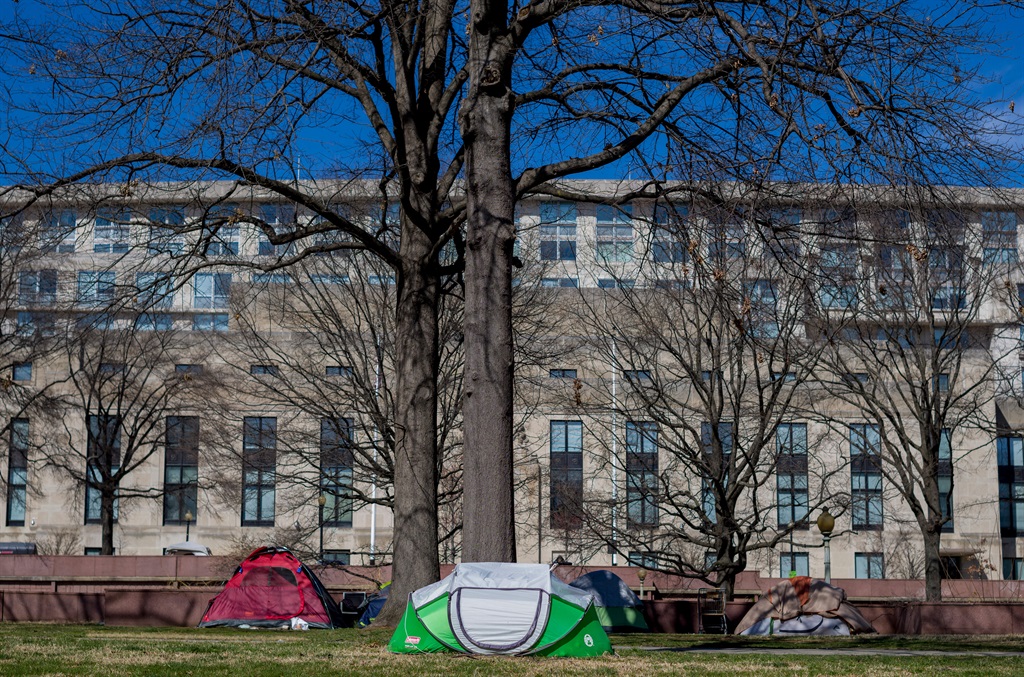
- Washington implemented a landmark law to ban all discrimination against homeless people.
- The Law is a US first and puts housing status on par with sexism and racism.
- A study found that 93% of Washington's homeless face discrimination.
Over the four years Rich has been homeless in Washington DC, he says he has experienced discrimination based on his skin colour, dreadlocked hair – and his housing status.
"It's always been a constant thing. If you don’t have your own housing, your own place to stay, people are always going to treat you differently," Rich, who asked to be identified only by one name, told the Thomson Reuters Foundation.
Police suspected he was selling drugs when he simply had no place to go. Rich also said he had trouble getting help for his two children and met with scepticism from would-be employers.
READ | UK heatwave: Homeless offered ice cream, redheads get free movie tickets
Other homeless people recount similar stories: being thrown out of upscale grocery stores or warm libraries for carrying too many bags, or accused of faking ailments just to wangle a bed.
"Discrimination against people without a home has been a troubling trend for too long," said Jeff Olivet, executive director of the US Interagency Council on Homelessness, which coordinates federal policy on the issue.
It can mean no job, no school, no help or benefits.
Just last month, Rich, 28, filled an application for a fast-food job. "Because I didn’t have an address, they didn’t hire me," he said.
Rich also works as a peer youth specialist with Sasha Bruce Youthwork, helping homeless young people, and says he hears similar tales of bias playing out.
He said:
But now "these things" may start happening a little less.
This month, Washington implemented a landmark law to ban all discrimination against homeless people – whether by employers, landlords, law enforcement, private businesses or others.
It is the first such law in the country, putting housing status on a par with race, gender, age, disability and 17 other such issues.
It comes as housing instability has risen across the country – and as cities and states criminalize aspects of homelessness, such as sleeping outside or in vehicles.
Washington counted more than 4 400 homeless people in its latest count in January; the city of 700 000 has a goal of ending homelessness by 2025.
It took close to a decade for the city to agree on the new law, and today’s tough economic climate make it especially timely, supporters say.
"We have to make sure we’re not making the road forward harder on unhoused people,” said Robert C. White Jr., the D.C. Council member who spearheaded the latest iteration of the law.
"If they're facing housing discrimination, that makes solving homelessness harder, not easier. If employers are discriminating in who they hire, that makes ending homelessness harder not easier."
The new law has sharp teeth, too.
It has a budget for staff to investigate allegations of discrimination and educate law enforcement, and infractions can lead to civil and other penalties, White said in an interview.
The probes and penalties make the law "monumental", said Lily Milwit, an attorney at the National Homeless Law Centre.
"It's good for states and localities to be considering pre-emptive legislation like this, as we’re seeing the opposite take hold in a lot of states."
The 93%
Washington was first pushed to act after a landmark 2014 study showed 93% of unhoused locals reporting discrimination.
That included more than 70% of people feeling they had been discriminated against by private businesses, two-thirds by law enforcement and almost half by medical services.
Turned away from coffee shops and harassed by police, respondents said they were even refused medical care or accused of “faking” illness to get off the street.
In 2018, the Urban Institute think tank found 15% of landlords in Washington refused to accept government housing assistance vouchers.
Robert Warren, a founding member of the People for Fairness Coalition advocacy group, has been pushing for the new law for nearly a decade, and said the 2014 findings remain relevant.
He said a woman he knew was recently kicked out of an upscale grocery store, with security referencing “the number of bags she had, and how homeless people shouldn’t be there.”
Libraries likewise have made rules about bag numbers, Warren said, while many parts of the city lack restrooms, and private establishments often bar homeless people from using theirs.
He expressed hope the new law will encourage neighbouring states to act - and critics to dial down their language, too.
“Some of the verbal abuse directed at folks experiencing homelessness – maybe some that can be tamped down some.”
Bill of Rights
DC is now leading the country on this strategy, but it is not acting alone.
Three states have already passed homeless “bills of rights”, though all are more limited in scope and lack enforcement mechanisms, said the National Homeless Law Centre's Milwit.
Rhode Island was the first to do so, in 2012.
Megan Smith, an outreach worker with House of Hope, a non-profit said:
While the legislation was a symbolic landmark, it has never been legally enforced, she said.
Violations “were widespread then, and they’re widespread now. Most people still experience multiple kinds of discrimination.”
Now advocates want to change that.
Margaux Morisseau, of the Rhode Island Coalition to End Homelessness, said a top priority this year would be tweaking the legislation or pushing officials to finally enforce it.
“We need to make sure that we’re educating people enough so that people know what to do when their rights have been violated, and that there’s enough proof so that injustice can be confronted,” she said.




 Publications
Publications
 Partners
Partners























